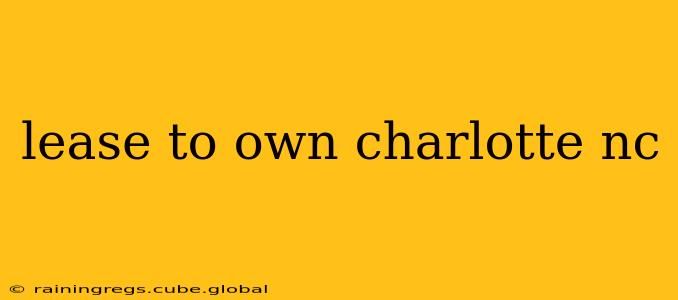Charlotte, North Carolina, a vibrant city boasting a thriving job market and a dynamic lifestyle, presents a competitive real estate landscape. For many aspiring homeowners, the traditional route of securing a mortgage can feel daunting. This is where lease-to-own (LTO) options in Charlotte, NC, emerge as an attractive alternative. This guide will explore the intricacies of lease-to-own agreements, address common questions, and provide valuable insights for those considering this path to homeownership in the Queen City.
What is Lease to Own?
A lease-to-own agreement, also known as a rent-to-own agreement, is a contract between a tenant (you) and a homeowner (landlord) where you pay rent while simultaneously working towards purchasing the property. A portion of your monthly payment is allocated towards the eventual purchase price, often with an agreed-upon price set upfront. It's a stepping stone for those who may not qualify for a traditional mortgage immediately but are committed to owning a home in Charlotte. The terms are customized and often include a specific timeframe for purchasing the property, along with stipulations regarding repairs, maintenance, and potential penalties for early termination.
How Does a Lease-to-Own Agreement Work in Charlotte?
The process typically involves these steps:
-
Finding a Suitable Property: This can be done through real estate agents specializing in lease-to-own properties, online listings, or by directly contacting homeowners. Charlotte has several resources dedicated to connecting buyers with suitable LTO options.
-
Negotiating the Terms: This is a crucial phase where you negotiate the purchase price, rent amount, option fee (a non-refundable fee securing the option to buy), and the length of the lease agreement. Having a real estate attorney review the contract is highly advisable.
-
Entering into a Contract: Once terms are agreed upon, a legally binding contract is drawn up, outlining all aspects of the agreement. This protects both the buyer and the seller.
-
Making Monthly Payments: Regular monthly payments are made, with a portion contributing to the eventual purchase price.
-
Securing Financing: Towards the end of the lease period, you'll need to secure financing (mortgage) to complete the purchase. Your consistent payments during the lease period can strengthen your financial position and improve your chances of securing a mortgage.
-
Purchasing the Home: Once financing is approved, the purchase is finalized, and you become the homeowner.
What are the Advantages and Disadvantages of Lease to Own in Charlotte?
Advantages:
- Improved Credit Score: Consistent rent payments can help improve your credit score, making you a stronger candidate for mortgage approval later.
- Opportunity for Homeownership: It's a pathway to homeownership for those who might not qualify for a traditional mortgage immediately.
- Time to Save: The lease period allows you time to save money for a down payment and closing costs.
- Familiarization with the Property: You'll live in the home during the lease period, allowing you to assess its condition and suitability.
Disadvantages:
- Potential for Financial Risk: The option fee is typically non-refundable, and you might lose this investment if circumstances prevent you from purchasing the property.
- Limited Flexibility: Lease-to-own agreements are usually less flexible than traditional rentals.
- Higher Costs: Monthly payments are often higher than traditional rentals because they include a portion of the purchase price.
- Market Fluctuations: Changes in the real estate market might affect the property’s value, impacting your final purchase price.
What are the Costs Associated with Lease to Own?
Costs associated with lease to own in Charlotte include:
- Option Fee: A non-refundable fee to secure the right to purchase the property.
- Monthly Payments: These are usually higher than standard rent and include a portion towards the purchase price.
- Property Taxes and Insurance: These are typically paid by the tenant during the lease period, or shared responsibility may be outlined in the contract.
- Repairs and Maintenance: The responsibility for repairs and maintenance might be shared or solely the responsibility of the tenant, as outlined in the lease agreement.
- Closing Costs: You’ll still incur closing costs when you finally purchase the home.
How Can I Find a Lease to Own Home in Charlotte?
Finding a lease-to-own home in Charlotte requires proactive searching. Working with a real estate agent familiar with lease-to-own agreements is highly recommended. Online real estate portals may also list lease-to-own options, but thorough research and professional guidance are crucial.
What if I Can't Secure Financing at the End of the Lease?
This is a significant risk associated with lease-to-own agreements. It's essential to carefully review the contract and understand the implications if you can't secure financing at the end of the lease term. The contract should clearly state what happens in this scenario – potential loss of the option fee or other financial penalties. It's critical to build a strong financial foundation during the lease period to maximize your chances of securing financing.
Is Lease to Own Right for Me?
The suitability of a lease-to-own agreement depends on your individual circumstances and financial situation. Carefully weigh the advantages and disadvantages, consult with financial advisors, and review the contract thoroughly before committing. A knowledgeable real estate agent and legal counsel can provide invaluable guidance throughout the process.
By understanding the complexities of lease-to-own agreements and taking a cautious, informed approach, aspiring homeowners in Charlotte, NC, can successfully navigate this pathway to realizing their dream of homeownership.
